Enhancing Research Capabilities, Establishing Collaborative Systems
Participation of IBS-Korea and Japan’s RIKEN,

Top-Tier Project Overview. ⓒ Ministry of Science and ICT, ‘[Daily News = Reporter Kim So-hee] The Ministry of Science and ICT has selected four research projects for the ‘Top-Tier Research Institute Collaboration Platform and Joint Research Support (Top-Tier)’ project, aimed at building a comprehensive and sustainable collaboration system among the world’s leading research institutions.’,
,
, ‘According to the Ministry of Science and ICT on the 29th, the Top-Tier project aims to move beyond the existing international joint research support system, which has been separated by types such as joint research and manpower exchange, and instead focus on enhancing domestic research capabilities through participation in top-tier research institutions worldwide and building a sustainable collaboration system (platform) through exchange of manpower and information.’,
,
, ‘The four selected research projects involve the participation of the Institute for Basic Science (IBS)-RIKEN (Japan), Seoul National University-Stanford University (USA), Korea Advanced Institute of Science and Technology (KAIST)-MIT (USA), and Korea Research Institute of Chemical Technology-Rega Institute for Medical Research (Belgium) as the lead organizations.’,
,
, ‘The rare isotope research conducted by IBS and RIKEN is essential in the field of basic science as it aims to understand the origins of cosmic elements and the fundamental properties of rare nuclei since the Big Bang, which can also be applied in materials and physical sciences, new energy development, and bio-life sciences. This research project aims to pioneer and explore new scientific technologies for creating extreme rare isotopes through the Korean-type heavy-ion accelerator RAON.’,
, ,
, ‘The collaborative project between Seoul National University and Stanford University focuses on utilizing synthetic fuels generated through carbon capture/utilization by linking hydrogen utilization and CCUS technologies, with the key goal of using these synthetic fuels as hydrogen storage materials.’,
,
, ‘The KAIST-MIT research team plans to establish a material design base using AI in the comprehensive field of electrochemistry (next-generation solid-state batteries, CO2 conversion, green hydrogen production), and will embark on innovative technology development by automating material synthesis, cell assembly, and evaluation processes, eliminating human errors through the establishment of a self-driving experimental laboratory. The government expects that accumulating experience in establishing and operating autonomous experimental laboratories will lead to resolving the shortage of research personnel and contributing to reducing material and process costs, promoting a leading research culture in the laboratory.’,
,
, ‘The Korea Research Institute of Chemical Technology aims to develop therapeutic agents and vaccine candidates for six viruses with pandemic potential (SARS-CoV-2, Influenza, Dengue, RSV, Nipah, Rhinovirus) through cooperation with domestic and international research institutions.’,
,

